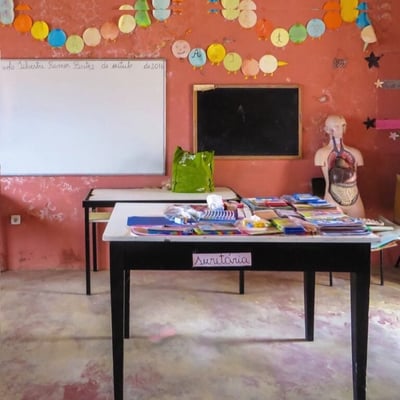1
00:00:02,913 –> 00:00:06,493
Olá, eu sou o Adriano.
{{Hi, I’m Adriano.}}
2
00:00:06,493 –> 00:00:09,443
Tenho trinta e cinco anos.
{{I’m 35 years old.}}
3
00:00:09,443 –> 00:00:11,970
Sou muito alto.
{{I’m very tall.}}
4
00:00:11,970 –> 00:00:16,506
Tenho o cabelo preto e olhos verdes.
{{I have black hair and green eyes.}}
5
00:00:16,506 –> 00:00:22,073
Sou cientista e trabalho num laboratório.
{{I’m a scientist and I work in a lab.}}
6
00:00:22,073 –> 00:00:26,003
Sou muito cuidadoso e trabalhador.
{{I’m very careful and hard-working.}}
7
00:00:26,003 –> 00:00:29,763
Sou também muito introvertido.
{{I’m also very introverted.}}
8
00:00:29,763 –> 00:00:33,663
A minha mulher chama-se Sofia.
{{My wife’s name is Sofia.}}
9
00:00:33,663 –> 00:00:38,353
Estamos casados há sete anos.
{{We’ve been married for 7 years.}}
10
00:00:38,353 –> 00:00:42,793
A Sofia tem trinta e sete anos.
{{Sofia is 37 years old.}}
11
00:00:42,793 –> 00:00:44,370
Ela é baixa.
{{She is short.}}
12
00:00:44,370 –> 00:00:48,623
Tem o cabelo loiro e olhos azuis.
{{She has blonde hair and blue eyes.}}
13
00:00:48,623 –> 00:00:51,622
Ela é advogada.
{{She is a lawyer.}}
14
00:00:51,622 –> 00:00:56,313
Ela é muito inteligente e extrovertida.
{{She’s very smart and outgoing.}}
15
00:00:56,313 –> 00:00:60,633
A Sofia e eu temos dois filhos.
{{Sofia and I have two children.}}
16
00:00:60,633 –> 00:01:03,442
A nossa filha é tímida.
{{Our daughter is shy.}}
17
00:01:03,442 –> 00:01:08,073
Ela gosta de estar sozinha a maior parte do tempo.
{{She likes to be alone most of the time.}}
18
00:01:08,073 –> 00:01:11,493
É introvertida, como eu.
{{She’s introverted, like me.}}
19
00:01:11,493 –> 00:01:14,882
O nosso filho é muito confiante.
{{Our son is very confident.}}
20
00:01:14,882 –> 00:01:20,242
A maior parte do tempo, ele gosta de estar com outras pessoas.
{{Most of the time, he likes to be with other people.}}
21
00:01:20,242 –> 00:01:24,262
É extrovertido, como a Sofia.
{{He’s extroverted, like Sofia.}}
22
00:01:24,262 –> 00:01:27,873
Os nossos filhos são muito diferentes,
{{Our children are very different,}}
23
00:01:27,873 –> 00:01:31,602
mas são ambos muito amáveis.
{{but they’re both very kind.}}
24
00:01:31,602 –> 00:01:37,452
Hoje, vamos visitar os nossos novos vizinhos.
{{Today, we’re going to visit our new neighbours.}}
25
00:01:37,452 –> 00:01:40,712
Os nossos vizinhos são de Espanha,
{{Our neighbours are from Spain,}}
26
00:01:40,712 –> 00:01:45,442
mas estão a viver em Portugal há três anos.
{{but they’ve been living in Portugal for 3 years.}}
27
00:01:45,442 –> 00:01:50,882
São ambos professores e são muito simpáticos.
{{They’re both teachers and they’re very nice.}}
28
00:01:50,882 –> 00:01:57,322
A nossa filha está preocupada porque não gosta de falar com pessoas novas.
{{Our daughter is worried because she doesn’t like talking to new people.}}
29
00:01:57,322 –> 00:02:03,852
O nosso filho está entusiasmado porque gosta de falar com toda a gente.
{{Our son is excited because he likes talking to everyone.}}
30
00:02:03,852 –> 00:02:07,632
Às vezes, até fala demais!
{{Sometimes, he even talks too much!}}
31
00:02:07,632 –> 00:02:12,073
Mas ele diz que hoje vai estar mais calado.
{{But he says he’ll be quieter today.}}
32
00:02:12,073 –> 00:02:16,683
Os nossos filhos estão lá fora, neste momento.
{{Our kids are outside right now.}}
33
00:02:16,683 –> 00:02:21,823
O nosso filho já está a brincar com os filhos do vizinho.
{{Our son is already playing with the neighbour’s kids.}}
34
00:02:21,823 –> 00:02:27,453
A nossa filha está nas escadas, apenas a observar.
{{Our daughter is on the stairs, just watching.}}
 We respect your privacy and have a ZERO TOLERANCE for spam.
We respect your privacy and have a ZERO TOLERANCE for spam.
















Just the right pace for me thanks.
Yes that is a good pace.
yes ,we feel suddenly good in portuguese
Great pace and easy to understand !
followed that very well, giving me some confidence !
I really enjoyed this exercise as there was a lot of new vocabulary to help in forming sentences.
Gosto muito estas “shorties”!!! Perfeito! Obrigada!
Gosto muito estas “shorties.”
Mas, posso “download” o Vocabulário e as Expressões para revisar mais tarde.
Obrigado.
Obrigado, Steve! Registámos a tua sugestão. Além disso, em breve, será possível adicionar palavras e expressões do Vocabulário e Expressões à lista de Smart Review 🙂
I just wondered why the article “0” is used for the hair but not “os” in the sentence : Tem o cabelo loiro e olhos azuis. ? I expected also “os ohlos azuis”
Olá, Math. In this kind of sequential descriptions, it’s common and acceptable to omit some or most of the articles, just for convenience. You can also keep them there, though. So, you have all these options:
– Tem o cabelo loiro e os olhos azuis (no omission)
– Tem o cabelo loiro e olhos azuis (partial omission)
– Tem cabelo loiro e olhos azuis (full omission)
Wow, at last I feel that I can understand much much more and feel that I am definitely making progress . Thank you.
Obrigado por essa explicação clara.
Yes, very good for learning some expressions as well.
It would be helpful to have the pronunciations for the new vocabulary that is introduced in these dialogues as in other areas of the lessons.
This feature is in the works! 🙂 Soon you will be able to hear the pronunciations for the vocabulary and expressions sections, and also add those to your Smart Review.
I loved this section, It was easy to follow and understand,it has given me more confidence.
Thanks 👍
Oh dear this has just renewed my feeling that I am not picking up the language as well as I’d like. A lot of these phrases were absolutely unknown to me.
Don’t worry! Everybody has a different history of what words/phrases they’ve come across. These just haven’t happened to come up for you. If you notice any patterns in the types of words/phrases you have the most trouble with, let me know and I’d be happy to recommend some units to get more practice. In this one, for example, the verbs ser and estar and possesives are used a lot, which are both tricky topics. There are also a number of adjectives that you may not have encountered before, but maybe this episode will help you to remember them for next time!
I would also recommend spending some time with Smart Review (under the Learn tab) if you feel things aren’t “sticking”. If you’ve done a lot of the units, it’s quite a bit to process, so it’s good to check in with yourself and review regularly.
Thanks Molly, you give me hope!
Cool!
Please, add audio to the Vocabulary and Expressions sections and to the answers in the Quiz once selected. Would be great!
Regards
Absolutely, we’re working on that now actually 🙂 Coming soon…
I feel like there are way too many new words and phrases that weren’t introduced in previous lessons in this section. Without turning on translation, I couldn’t understand most of this. If I only follow through the program here, I don’t think it’s sufficient to understand this dialog.
Thanks for the feedback and sorry for the frustration with this one! We definitely don’t expect you to understand every word of these, so don’t worry. The goal is to show you how what you’re learning fits into a more realistic context, along with things you haven’t learned yet. We think it’s important to start exploring the language early, even if you can’t understand everything yet. This helps give you a broader “picture” of the language that you won’t get from only learning at the sentence level.
We expect that you’ll use the translation quite heavily in the beginning, but over time you can rely on it less and less. In the beginning, we hope you’ll be able to understand bits and pieces and that it will be a good challenge and opportunity to pick up new vocabulary and phrases. I would recommend reviewing the Vocabulary and Expressions tabs before listening to the Shorty, to give yourself a preview of what you’re going to hear. But don’t feel like you have to have mastered every part of it before moving on.
All that said, we appreciate the feedback and we’ll take a look at this one. We want it to be challenging, not frustrating, so it’s helpful to know how everyone is experiencing these. Thanks again!
Coming in at around a B1/B2 in Spanish and Brazilian Portuguese but lacking real world listening skills in both with zero knowledge of pronunciation in European Portuguese. I was able to keep up at regular speed and understated all but a couple of words (like loira want brinquear) that I could figure out in context. This fulfills exactly what I was hoping for! I’m engaged, I’m learning, I’m not feeling as if the lessons are overly simplistic. Muito bom! Eu estou muito feliz!
I started as an A1 beginner a few lessons ago, and suddenly there is this A2 level passage with loads of new words and phrases all at once? I think you must lose some people here. The -10 seconds button is essential to keep repeating some of the sentences and try to slowly learn the whole thing. I’m glad you have a good tool for looking at the new material. I also use DeepL in a tab to help.
Thanks for the feedback on this! That makes sense — I understand it may feel like a bit of a shock to go from the A1 lessons to this passage.
But don’t worry, we don’t expect you to understand every bit at this stage. At the A1 level, you’re working on words and short phrases and starting to learn the basics of the language. You won’t be able to understand a full conversation or narrative just yet, but we hope you can pick out some bits and pieces. We think it’s important to give you this opportunity to see how what you’ve learned about ser and estar fits in a more realistic context, but we expect you’ll use the Translate button quite heavily at this stage.
All that said, it’s helpful to know how you’re experiencing this and we’ll look into other options for getting these concepts across more simply, while still providing enough context. 🙂
I have to agree that this part was a little too much appearing in the A1 section introducing estar and ser. I understand the desire to show the different usages in a more realistic context, but there are so many new words and concepts in a lot of the phrases. It’s a bit overwhelming and can confuse people on just how much they should be understanding.
It was good to hear this passage. It stretched me, yes. But it did not feel overwhelming. I found it interesting that you use the verb ESTAR to describe one being short, but you use the bee SER to describe being tall. Did I get that right?
Ela é baixa
Sou muito alto
That’s great! This is a tough one for sure, but I’m glad it was the good kind of challenge for you.🙂 Good question — this is actually “ser” in both examples. It’s confusing because “ser” is a very irregular verb, so the conjugations don’t all look like the verb, as they do with many others. Here are the conjugations for reference:
Present tense conjugation of ser
Present tense conjugation of estar
Hi, in the story Adriano sais that he and his wife “estamos casados” for 7 years. For me it could have been “somos casados” as well.
And yes in the quiz the question is “cuantos anos é casado”. Are both expressions using ser and estar correct?
Olá. Good question! In contexts where we’re describing for how long a marriage has lasted (e.g. “Eu sou/estou casado há vinte anos”), both verbs (ser and estar) are acceptable. I don’t have a very good explanation for this – we use them both without thinking much about it! But when we’re just describing our/someone’s marital status, we mostly use the verb ser (e.g. “Elas são casadas”). Historically, marriages were expected to be permanent and the verb ser reinforces this.